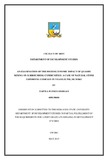Please use this identifier to cite or link to this item:
https://cris.library.msu.ac.zw//handle/11408/3325| Title: | An examination of the socio-economic impact of quarry mining on surrounding communities: a case of natural stone exporting company in Nyamuzuwe, Mutoko | Authors: | Sisimayi, Tapiwa Patson | Keywords: | Socio-economic impact Quarry mining Corporate social responsibility Empowerment |
Issue Date: | 2015 | Publisher: | Midlands State University | Abstract: | The main focus of the research was on the socio-economic impact of quarry mining on surrounding communities. The research focused on Mutoko district’s ward 7 which is where Natural Stone Exporting Company is situated. The research was aimed at establishing strategies and means to enable the community to benefit from its natural finite resource. The research aimed at identifying and assessing the impacts of the operations of Natural Stone Exporting Company and to establish the effectiveness of the strategies being employed by Natural Stone Exporting Company (NSEC) to promote rural socio-economic development and to examine the limitations of the strategies adopted by NSEC’s in promoting socio-economic development. The research was also aimed at establishing intervention strategies in promoting socio-economic development. The word corporate social responsibility was contextualised and hypothesized in this research – that is the ability to give back some of the business profits to the community with the aim to develop the surrounding community in which Natural stone exporting company operates in. Corporate social responsibility aims to positively impact on the socio- economic situation of communities. It is through this practice that mining companies are compelled to sustainably utilise finite resources as well as to rehabilitate the environment to its former state. The research subscribed to a descriptive approach of doing a research. Purposive and convenience sampling techniques were employed to come up with a total of sixty five respondents. Stratified sampling was used to come up with five strata of respondents, the villagers, NSEC management, councilors, District top management, and teachers. A participatory appraisal modus operandi – Focus Group Discussion – was used to elicit data from villagers, workers and top management; questionnaires with both closed and open ended questions were used for district top management. Interview guide was also used in the process of gathering data from the above stated five strata. A total of forty- eight respondents from the fifty interview respondents provided data for this research, which has been analyzed and presented in chapter four. The results of the research reflected that there are various negative impacts from the operations of NSEC affecting the whole of Mutoko district. Quarry mines are destroying the natural land scape, in the process exploiting the natural resource (Black Granite) without giving back to the community. NSEC as a mining company does not exercise meaningful Corporate Social Responsibility for the surrounding community and for Mutoko at large. Natural Stone Exporting Company also does not have effective reclamation strategies hence they are leaving galleys that are killing both humans and livestock. Development strategies that were identified included the development levies and the community share ownership trust scheme. Another strategy being employed by this company is to employ locals. Recommendations that have been suggested include that these mining companies should come up with industries that promote value addition in the form of cutting and polishing in Mutoko. These value addition companies have the potential of increasing employment as well as the value of development levies and royalties. Natural Stone Exporting Company is also supposed to come up with effective reclamation strategies. The other recommendation was that, in line with the Indigenisation and Economic Empowerment drive, locals should also become shareholders and not just a source of cheap labour. Of paramount importance is for the local business people to come up with their own quarry mining companies which are indigenously owned. These local business people can passionately develop the area since they can identify with it more closely as compared to foreigners. | URI: | http://hdl.handle.net/11408/3325 |
| Appears in Collections: | Post-graduate Diploma In Development Studies |
Files in This Item:
| File | Description | Size | Format | |
|---|---|---|---|---|
| Tapiwa Finale to print.pdf | Full Text | 2.05 MB | Adobe PDF |  View/Open |
Page view(s)
410
checked on Feb 21, 2026
Download(s)
180
checked on Feb 21, 2026
Google ScholarTM
Check
Items in MSUIR are protected by copyright, with all rights reserved, unless otherwise indicated.



